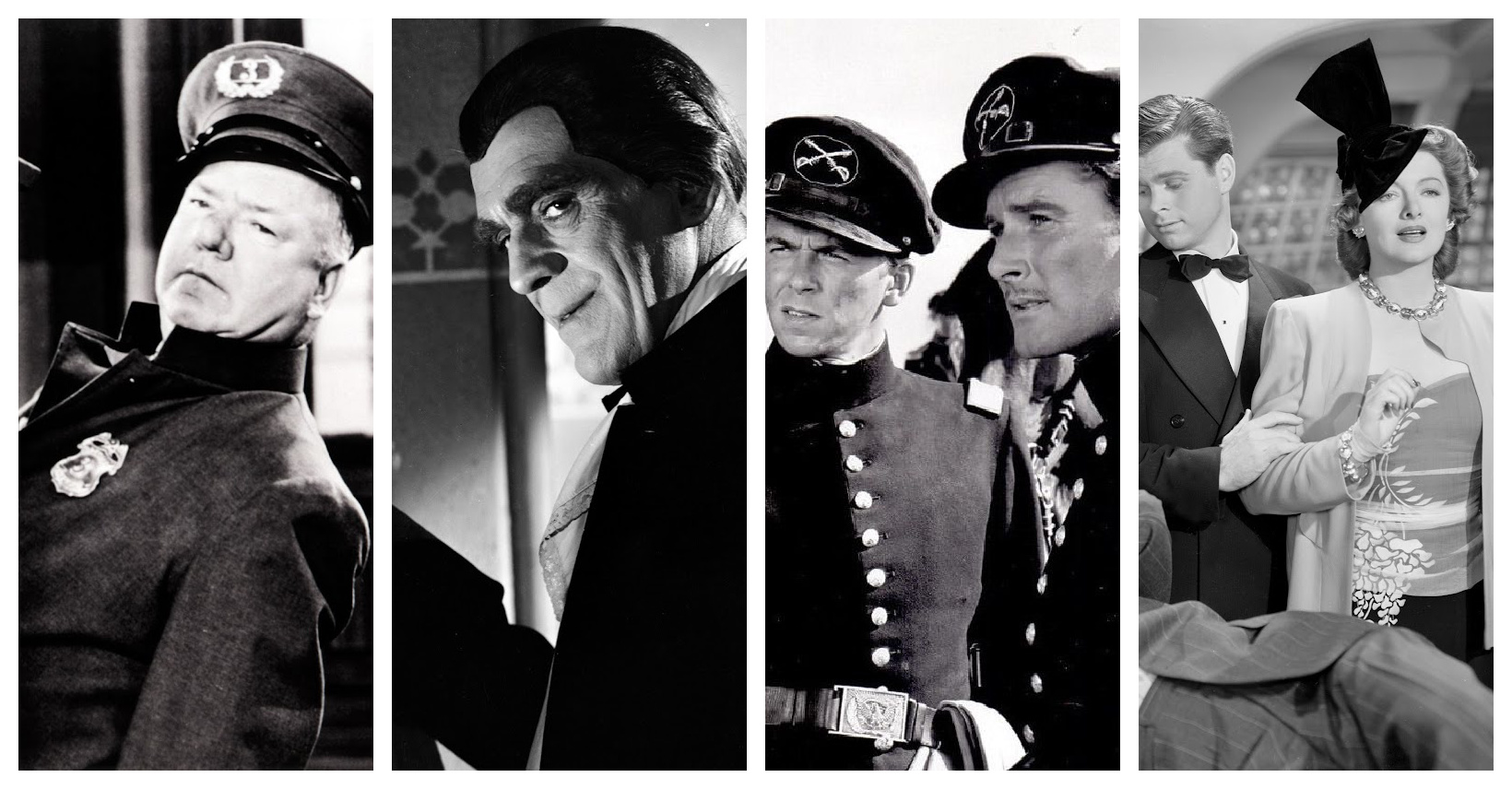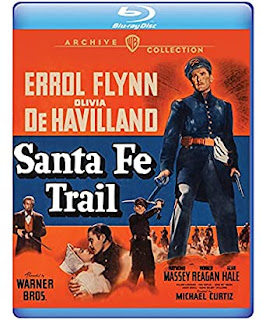New on Blu-Ray | The Bank Dick, Bedlam, The Ghost Ship, Santa Fe Trail, Shadow of the Thin Man
THE BANK DICK (Edward F. Cline, 1940) - Kino Lorber
W.C. Fields teamed up with frequent Buster Keaton collaborator Edward F. Cline to create this freewheeling, stream-of-consciousness comedy that somehow ended up on Stanley Kubrick's list of the 10 greatest films of all time. While I wouldn't go quite that far, it is an impressive piece of work, an almost avant-garde piece of anti-cinema masquerading as a lowbrow comedy, in which Fields stars as drunken, henpecked ne'er-do-well Egbert Sousé ("accent dram above the e") who accidentally helps apprehend a gang of bank robbers and finds himself with a new job protecting the local bank as a security guard. But when his daughter's boyfriend "borrows" $500 from the bank to buy an engagement ring on the day the bank inspector arrives for a surprise visit, Sousé must do all he can to distract the inspector while his future son-in-law tries to come up with $500 to pay his debt before anyone notices.What makes The Bank Dick such a fascinating film is that Fields seems to be simply making it all up as he goes along. Jokes are set up with no punchline, subplots brought up then almost immediately abandoned, many of Fields' one-liners are thrown away or buried in his mumbling delivery. And it's all kind of great. There's a hilarious sense of nonchalance about the whole thing, and if Fields and Cline are just throwing everything they've got at this thing and seeing what works as the film is unfolding. It doesn't always land, but it's nearly impossible not to be engaged with the level of sheer cinematic anarchy on display here. And not fast paced, unhinged anarchy, but the feeling that a bunch of friends got together, fucked around, and made a movie without much of a plan, and somehow stumbled into something that defies categorization. It really has to be seen to be believed.
GRADE - ★★★½ (out of four)
BEDLAM (Mark Robson, 1946) - Warner Archive
Boris Karloff goes full Boris Karloff in Bedlam, a Val Lewton produced horror thriller that casts the legendary actor as the keeper of an insane asylum who uses his position to have his enemies declared insane and locked away in his "care." Appalled by the conditions of Bedlam, Nell Bowen (Anna Lee) sets out on a crusade to have the institution shut down, leading Karloff's evil Dr. Sims to have her committed, where she must rally the other patients to her side in order to put the doctor's private prison to rest for good.
Ostensibly about the improvement of conditions for mental health patients over the years, Bedlam attempts to balance horror with social conscience in a way that doesn't always work, but Lee and Karloff make for excellent foils, and it's thrilling to watch the two of them go toe to toe in a kind of proto-One Flew Over the Cuckoo's Nest, even if this time the trademark Lewton psychology seems somewhat misplaced since the audience is in on Bowen's sanity from the get-go.
GRADE - ★★½ (out of four)
THE GHOST SHIP (Mark Robson, 1943) - Warner Archive
Richard Dix stars as a sea captain with a secret on Mark Robson's The Ghost Ship, a deviously effective Val Lewton chiller that pits Dix's 3rd officer against the captain in a psychological game of cat and mouse. Russel Wade co-stars as 3rd officer Tom Merriam, who becomes convinced that Capt. Will Stone is a murderer, and tries to convince the rest of the crew that all is not right aboard ship. The narration by the mute officer is more grating than creepy, but otherwise Robson conjures an air of eerie menace. This being a Lewton picture, there are naturally no ghosts on this ghost ship, just suspicions unexplained deaths - and its all the better for it. There's an almost Hitchcockian flair to Robson's direction, turning the screws on the audience tightly right up until its explosive finale. It may end a bit too abruptly, but it's 69 minutes of slowly mounting terror that constantly puts the audience's perception of reality in question - and Dix's brilliantly modulated performance keeps us guessing right to the end.
GRADE - ★★★ (out of four)
SANTA FE TRAIL (Michael Curtiz, 1940) - Warner Archive
Michael Curtiz's Santa Fe Trail is so full of red flags, even by 1940 standards, that's it's almost impossible to take seriously on any level in retrospect. While I'm a firm believer that films should be judged as products of their own time, Santa Fe Trail is such a nightmare of revisionist history that it never holds up to even the slightest scrutiny. Then again, any film that stars Ronald Reagan as George Armstrong Custer as a hero fighting against "villainous" abolitionist John Brown (Raymond Massey) should absolutely be met with resistance from both film critics and historians.Disregarding the film's egregious reframing of history, Santa Fe Trail is one of Curtiz's blandest and most pedestrian films - competently structured but otherwise unremarkable considering the high points of his career (he would go on to direct Casablanca the very next year). The root is the problem is the film's muddled ideology and historical perspective, which tries to "both sides" the Civil War by framing both the Union and the Confederacy as good faith actors trying to find a compromise on slavery, only to be sabotaged by the radical Brown. The film works overtime trying to explain that it agrees with Brown's abolitionist sentiment, just not his tactics, which allows a ragtag team of both southern and northern protagonists to attempt to bring him to justice to prevent further conflict, culminating in the battle of Harper's Ferry and Brown's eventual execution. The film's attempt to find a middle ground on something as evil as human slavery hobbles it from the very beginning, and no amount of Errol Flynn charm or Ronald Reagan charm can put lipstick on this pig, which seems so confused about what that middle ground solution actually is. Curtiz was one of the most reliable filmmakers on the Warner lot, but Santa Fe Trail was a muddled mess that did not play to his strengths, and suffers as it tries to find a satisfactory compromise to one of the greatest of human evils.
GRADE - ★½ (out of four)
SHADOW OF THE THIN MAN (W.S. Van Dyke, 1941) - Warner Archive
Nick and Nora are off to the races in the fourth installment in the Thin Man series, which finds the husband and wife duo attempting to solve the murder of a jockey who threw a race. Shadow of the Thin Man is certainly settled in its formula at this point, and while it's certainly a step up from the previous entry, Another Thin Man, this one is squarely middle of the road. There's sparkling banter, lots of alcohol, and of course Asta the dog, but there's nothing here we haven't seen before. It's more focused on the mystery than its predecessor, which keeps the action more engaging, and the comedy is sharper - although at this point they're basically repeating all the same jokes. You know exactly what you're getting going into this one - and it delivers, maybe not with quite the same sparkle as its earlier entries, but Shadow of the Thin Man plays the hits with aplomb.








Comments